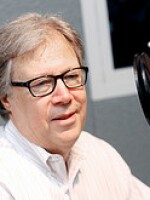For his Concora debut, Christopher Shepard will lead a program called "The Romantic Choir."
On Saturday night Christopher Shepard will, at long last, make his debut as the new conductor and artistic director of Concora.
Concora, for any newcomers to the area, is the region’s original professional choral ensemble.
I say long last because Shepard emerged as the winner of a search process that has taken nearly two years to unfold.
He is the successor to a local legend, never an easy task. The legend in this case is the redoubtable Rick Coffey, who personally founded the group in 1974 and led it for the next 40 years. Along the way he established Concora as one of the essential and defining musical ensembles of this state and region. The group’s artistry and enterprise have long been admired around here not just by lovers of choral music, but by people who love music, period.
So Shepard finds himself having to basically step in and replace the Johnny Carson of choral music. (Actually the Carson metaphor is imperfect, since Johnny presided over the Tonight Show for a mere 30 years, and also his interpretations of the Bach motets were generally considered less persuasive than Coffey’s.)
Shepard’s resume is interesting. He’s American, but he spent a dozen years in Australia, where he founded and led the Sydneian Bach Choir and Orchestra.
For his Concora debut Shepard will lead a program called “The Romantic Choir,” which will include works by Brahms, Mendelssohn, Schumann, Bruckner and Elgar, among others.
The 7:30 pm concert will be given at St. Thomas the Apostle Church at 872 Farmington Avenue in West Hartford.
For the usual particulars, go to the group’s website -- concora.org.
And while you’re there, check out the three short promotional videos the organization has produced to help audiences prepare for the Saturday concert. They are a great example of how technology can enhance the concert-going experience.
By the Time I Make Bowling Green
The great pop tunesmith Jimmy Webb (“Wichita Lineman,” “McArthur Park,” etc., etc.) has written a piano concerto.
The piece will be premiered next October by Orchestra Kentucky, with Jeffrey Biegel as the soloist.
I don’t know why, but I always have high hopes for these pop guys writing “serious” music. Hardly any of these pieces ever turn out to be anything remotely interesting (sorry, McCartney, Copeland, Tork and on and on) but I guess I keep thinking that one of these days another Gershwin will show up.
Garmany Series Presents the Dover Quartet
On November 19, the Garmany Chamber Music Series at The Hartt School continues with a concert by the Dover Quartet.

Now, the truth is that there are a lot of really brilliant young string quartets out there these days. And I’m encouraged to see that quite a few of them seem to be making a go of it -- more evidence, I think, that the chamber music sector of the classical music business really is flourishing. One of these days, I’m going to offer a blog devoted to that subject.
But back to Dover. As I’ve pointed out elsewhere, the way that fellow musicians and especially string players talk about this group is almost in a category by itself. The word “unbelievable” turns up fairly often.
The concert includes Mozart’s final quartet (K. 590), the beloved “American” quartet of Dvorak, and a new piece -- being given just its second public performance anywhere -- by the exciting young Pulitzer Prize-winning composer Caroline Shaw.
So if you’re free, come over and check them out for yourself. There are a few seats left.
Pre-concert reception, open to all, starts at 6:00 pm. The concert is at 7:00 pm in Millard Auditorium. More information at hartford.edu/hartt.
Robert Craft
Robert Craft died a few days ago, at age 92.
Craft was a conductor and music scholar. But he became best-known for being Igor Stravinsky’s personal assistant and dedicated aesthetic advisor from 1948 -- when Craft was still a Juilliard grad student -- until the composer’s death in 1971.

He published a series of books about his relationship with the great man, including several now-celebrated volumes of conversations with him. Those books have been long been suspected of being more Craft than Stravinsky, but they remain essential reading for anybody who seeks to understand the 20th century’s greatest composer. Or for that matter, the 20th century.
I interviewed Craft once. It was in 1997, in advance of his coming to town to guest-conduct the Hartford Symphony. He was famously contemptuous of journalists, and the first few minutes of the interview, as I recall, were bumpy. But when it became clear that I had actually read his books, and that my interest in Stravinsky was genuine, things went better. Of course, the term “better,” where Craft was concerned, mainly meant that he felt more comfortable decrying the state of culture in general and music in particular.
Looking for a nice, positive summarizing quote as our conversation wound down, I asked him something about the future.
He said, and I quote: “I think that classical music may be doomed.”
Rest in peace, Mr. Craft.
Steve Metcalf was The Hartford Courant's Fulltime classical music critic and reporter for over 20 years, beginning in 1982. He is currently the curator of the Richard P. Garmany Chamber Music Series at The Hartt School. He can be reached at spmetcalf55@gmail.com.



